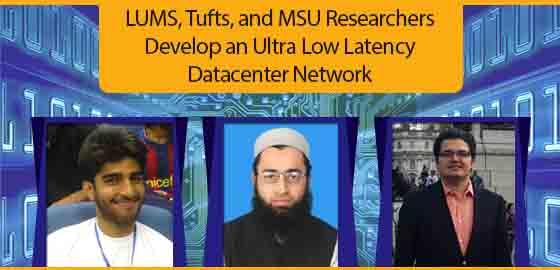
Dr. Ihsan Ayyub Qazi, Assistant Professor, Department of Computer Science, LUMS along with his students Syed M. Irteza and Ghufran Baig have devised a new system called PASE. The group also included Ali Munir and Dr. Alex Liu from Michigan State University and Dr. Fahad R. Dogar from Tufts University. Using PASE, the group has shown that the proposed system outperforms the state-of-the-art systems without requiring any changes in datacenter switches or middleboxes.
Large-scale web services like search (e.g., Bing, Google Search), social networking (e.g., Facebook and Twitter), and cloud-based storage (e.g., Dropbox) are usually hosted in datacenters, which are massive collections of servers, in order to serve large number of users’ requests. These services require extremely low latency as even a small increase in latency can degrade user experience and thus, reduce operator revenues. Like any large decentralised network, datacenters are prone to congestion: Packets from different application flows sharing a link can experience long delays when queues grow long.
PASE addresses this challenge by aiming to manage all traffic inside a datacenter in a centralised fashion. “Can we manage the entire datacenter network in a centralised manner? The answer was not at all obvious. In fact, the common belief in the research community was that it would not scale,” said Dr. Qazi.
Dr. Qazi further explained, “Another key challenge was the latency cost required to obtain a decision from a central entity. With, PASE, we addressed these fundamental challenges of scalability and latency of going to a central entity. In a way, this is perhaps the first work that shows how we can design a scalable logically centralised control plane for datacenters that substantially reduces the cost of going to a centralised arbiter.”
Through experimental evaluation, the researchers showed that PASE outperforms state-of-the-art schemes without requiring any changes to the existing hardware infrastructure. “By not requiring changes in infrastructure, one can save a significant amount of cost because datacenter operators make huge investments on infrastructure and lowers the bar for adoption,” said Dr. Qazi.
The key to PASE’s efficiency is in the way it divides functionality across hosts, switches and the central entity. Moreover, PASE’s logically centralised control divides the arbitration problem into two halves and solves the individual parts in parallel by leveraging the hierarchical structure of datacenter network topologies.
A research paper describing PASE has been accepted to appear in IEEE/ACM Transactions on Network, a premier journal on data networking. An earlier part of the project appeared in ACM SIGCOMM, the most prestigious research conference on computer networks.
